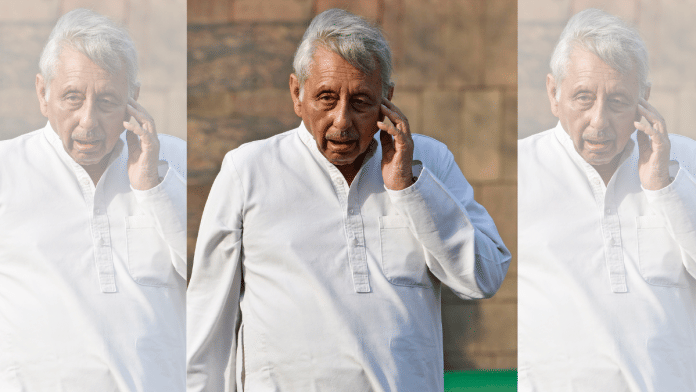New Delhi: Senior Congress leader Mani Shankar Aiyar sparked a row Tuesday when he referred to the 1962 Indo-China war as an “alleged Chinese invasion”.
He argued that India, then led by Prime Minister Jawaharlal Nehru, could have accepted former Chinese premier Zhou Enlai’s proposal for a resolution two years before the war broke out.
This comes as India is engaged in a tense border standoff with China since 2020, that began after 20 soldiers were killed in clashes with the Chinese troops in Ladakh.
At a book event at Delhi’s Foreign Correspondents’ Club of South Asia, Aiyar recounted writing the Indian Foreign Service exams in London when Tawang fell during the war with China. “In October 1962, the Chinese allegedly invaded India. On the day that Tawang fell, the foreign service exams began in London…,” he told the audience.
The Congress Party, however, distanced itself from Aiyar’s remarks, with Congress general secretary Jairam Ramesh saying that Aiyar had apologised “unreservedly” for using the term “alleged invasion” “mistakenly”. However, Ramesh also hit out at the Modi government for giving a “clean chit” to Beijing for their actions in May 2020.
Later, Aiyar was asked to clarify his remarks and why he used the word “alleged”. “There are various books that indicate that we could have accepted Zhou Enlai’s proposal of April 1960. We could have perhaps avoided war, by backing up our forward policy with adequate military strength to be able to open those forward posts,” he said.
Though Aiyar did not specifically mention what books, Sudheendra Kulkarni, a former aide to Prime Minister Atal Bihari Vajpayee, has written that Zhou offered to accept India’s control over Arunachal Pradesh, if New Delhi accepted Beijing’s control over Aksai Chin.
Zhou visited India from 19 April to 25 April 1960 wherein he held talks with Nehru which were ultimately, not productive.
“You would recall that Nehru had said that I’ve ordered the Indian Army to throw out the Chinese from the Thagla Ridge. There was a kind of riposte that came from the Chinese,” said Aiyar. In a sarcastic remark, the senior Congress leader said he shouldn’t have used the word “alleged” to describe the Chinese invasions, as “we are in the middle of an election”.
Aiyar made the remarks at the launch of the book ‘Nehru’s First Recruits’ by senior journalist Kallol Bhattacharjee. The book dwells about the first foreign service officers in independent India, many of whom were hand-picked by Nehru himself.
In 1962, the Indian and Chinese prime ministers had exchanged letters during a 3-week ‘lull period’ during the war.
On 24 October, Zhou wrote to Nehru offering a three-point proposal for peace. Apart from the disengagement and withdrawal of both sides 20 km from the Lines of actual control, the proposal mentioned a Chinese withdrawal in the eastern sector of the border to the north of the LAC and a guarantee that neither side would cross the line of present control in Aksai Chin. The third point was a proposal for talks between the premiers of both countries.
Even before Zhou wrote to Nehru, the Chinese government issued a press statement publicising its peace proposal to India.
On 27 October, Nehru retorted with a sternly-worded letter. “There have been repeated declarations by the Government of the People’s Republic of China that they want to settle the differences on the border question with India by peaceful means, though what is happening today is in violent contradiction with these declarations,” he wrote, insisting on reverting to the boundary as it was prior to 8 September, 1962.
Zhou turned this down, and instead suggested a return to the McMahon Line in the east and the Chinese claim line in Aksai Chin.
(Edited by Tony Rai)






